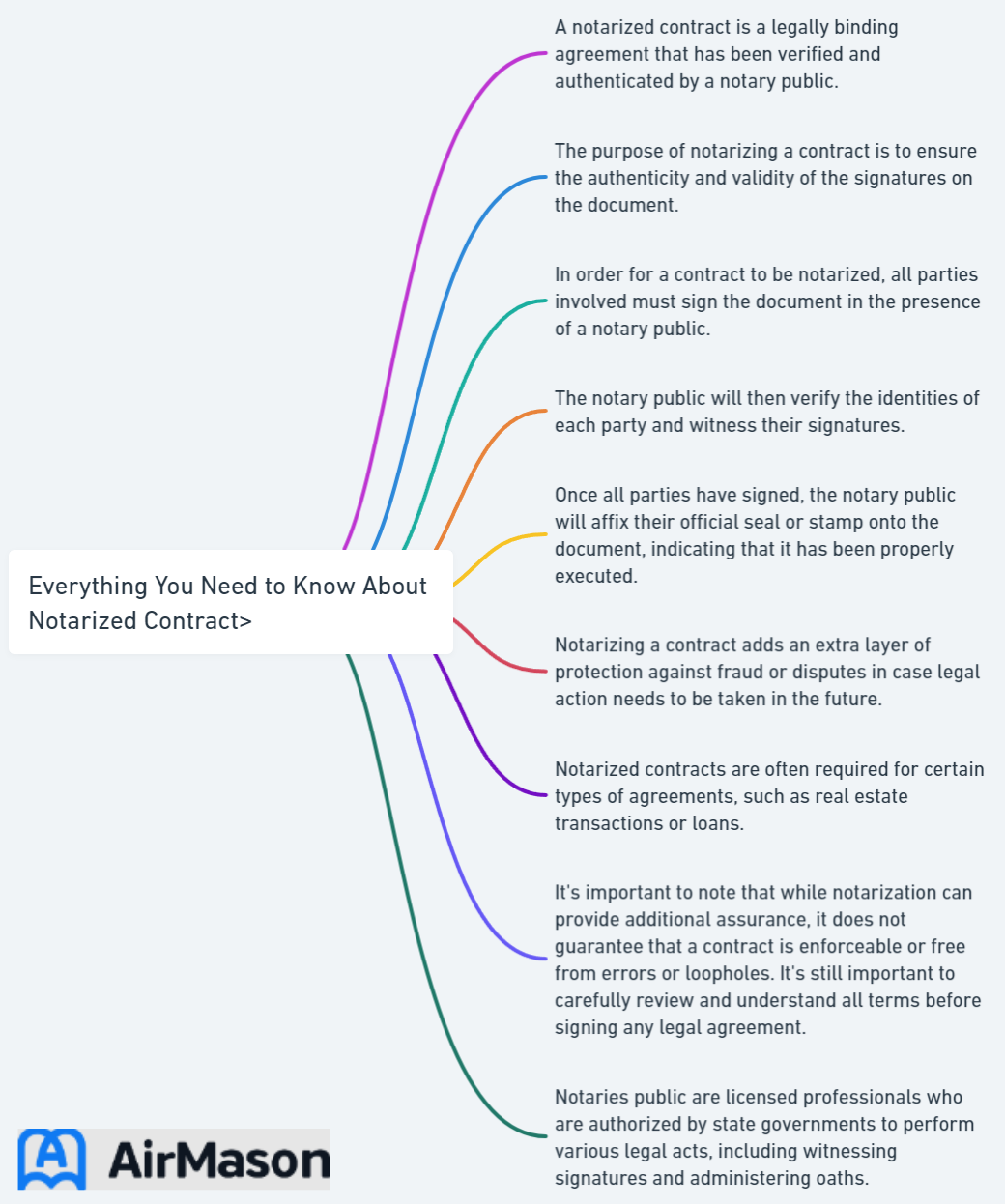
In a world where legal disputes can arise at any moment, notarized contracts provide a crucial layer of protection, security, and peace of mind. But what exactly is a notarized contract, and when is it necessary? This comprehensive guide will walk you through everything you need to know about notarized contracts, their importance, types, the notarization process, legal requirements for witnesses, and how they can help protect your business from potential contract disputes.
Key Takeaways
- Notarized contracts are legally binding documents that require a notary public to verify the identities of signatories and ensure enforceability in court.
- Certain types of contracts, such as real estate transactions, marriage agreements and commercial leases may require notarization depending on state laws.
- The process includes steps to locate a qualified Notary Public, verifying identity with government issued ID or alternative method accepted by local regulations & signing the contract in presence of Notary Public for legal protection.
Contracts Definition
When delving into the realm of legal agreements, understanding the contracts definition is paramount. In essence, contracts are formal, binding accords between two or more parties that outline the terms and conditions governing their relationship. These documents establish the rights and obligations of each party involved, providing a framework for conducting business or other transactions. A comprehensive grasp of the contracts definition is crucial for navigating the intricacies of various legal relationships, ensuring clarity and fairness in the exchange of goods, services, or promises. Whether you are a business professional, legal practitioner, or simply someone entering into an agreement, a solid understanding of the contracts definition is fundamental to making informed decisions and fostering successful collaborations.
Understanding Notarized Contracts
A notarized contract is a document notarized by a notary public, who verifies the identities of the signatories and provides legal enforceability in a court of law. Although not all signed contract documents require notarization to be legally binding, certain types of contracts, such as real estate transactions, marriage agreements, and commercial leases, often require notarization to prevent contract disputes and ensure legal enforceability.
The process of notarization includes locating a notary public, affirming the signers’ identity, and validating the contract through the witnessing of signatures. Witnesses are not mandated for all contracts, but they may provide additional evidence that the contract was willingly agreed to by all parties, without coercion, undue influence, or duress. Being well-versed with your state’s unique notarization requirements is important, given that federal courts may follow different rules.
 Importance of Notarization for Contracts
Importance of Notarization for Contracts
Notarizing a contract offers several benefits that add legal and financial value to the agreement. A notary public assists in making a contract notarized and legally enforceable by:
- Validating the signer’s identity and signature
- Providing legal and financial protection by deterring disputes
- Offering an advantage in court proceedings
- Authenticating signatures with a notary present
Notarization is particularly significant in transactions that legally must be in writing, including:
- real estate sales
- wills
- debt agreements
- real estate leases for a period of more than one year
Correct execution of the notarization process can help you circumvent potential legal challenges and guarantee your contracts’ enforceability.
Types of Contracts That Require Notarization
While notarization is not required for every contract, certain types of contracts, such as real estate transactions, marriage agreements, and commercial leases, may require notarization depending on the state laws.
In the subsequent sections, we will explore these specific contract types and examine notarization’s role in each context.
Real Estate Transactions
Real estate transactions often require notarization to ensure the validity and enforceability of the agreement. While real estate purchase agreements do not typically require notarization, other real estate documents such as:
- Deeds
- Titles
- Mortgages
- Refinancing documents
Certain documents may need notarization by a licensed attorney to fulfill legal obligations and ensure enforceability.
Neglecting to notarize a real estate contract could result in legal consequences, potentially making the contract unenforceable or invalid in a court of law. Ensuring proper notarization helps prevent fraudulent activities and provides evidence of the parties’ intentions, which is especially important when dealing with real estate transactions. It is recommended to consult a law firm for guidance on notarization requirements in your jurisdiction.
Marriage Agreements
Marriage agreements, such as prenuptial agreements, outline the financial and property rights of each spouse in the event of a divorce or separation. Notarizing a marriage agreement confirms that the document was signed correctly and that both parties willingly entered into the agreement with a notary present. This process helps prevent fraud and verifies the validity of the agreement.
Notarizing a marriage agreement offers several advantages, such as:
- Confirming identity
- Enhancing credibility
- Providing legal validity
- Safeguarding interests
- Providing assurance
Some states, like Massachusetts, California, and New York, require prenuptial agreements to be notarized, while others, like Texas and Florida, do not have this requirement for written contracts.
Commercial Leases
Notarization is applicable to commercial real estate leases in specific cases. Generally, if a lease is expected to be in effect for over three years, it must be notarized. This applies to automatic renewals and options as well. However, the exact notarization requirements may differ from one state to another. It is recommended to seek advice from a lawyer or legal expert to understand the notarization requirements for commercial leases in your area.
By authenticating the document with the official seal of a Notary Public, notarization of a commercial lease provides legal protection. This process verifies the legitimacy of the lease agreement and confirms the identities of the signatories, serving as a deterrent against fraudulent activities and providing evidence of the parties’ intentions.
Condition in a Contract
When considering the dynamics of a legal agreement, understanding the significance of a condition in a contract is paramount. A condition in a contract serves as a pivotal element that outlines specific requirements for the agreement’s execution or fulfillment. These conditions act as prerequisites, determining the rights and obligations of the parties involved. In essence, a condition in a contract functions as a crucial stipulation, ensuring that certain criteria are met before the contract can progress or be considered valid. Careful attention to the language and implications of conditions is essential in drafting contracts to create clear and enforceable agreements. This nuanced understanding of conditions in a contract is fundamental for both parties to navigate the terms effectively and uphold the integrity of the legal arrangement.
The Notarization Process: Step-by-Step Guide

While the notarization process might appear daunting initially, a comprehensive step-by-step guide can aid in navigating it smoothly. The process includes:
- Finding a notary public
- Verifying your identity
- Signing the contract in the presence of the notary public
- The notary public adding their stamp or seal to the document
Finding a Notary Public
Searching online directories, local banks, or government offices can help you find a qualified notary public. When selecting a notary public, consider the following criteria:
- Age: They should be at least 18 years old.
- Residency or citizenship status: They should be a resident or citizen of the relevant state.
- Course of study or training requirements: Check if your state has any specific requirements for notaries.
Considering these criteria will help ensure that the notary public you choose is knowledgeable of your state’s regulations and can assist you in fulfilling your legal obligation.
Reliable online directories for locating a notary public include Online Notaries Public and RON Notary Directory. It’s also essential to note that notaries are not authorized to provide legal counsel or interpret their title in other languages, as this falls under the purview of contract law professionals such as attorneys.
Verifying Identity
As part of the notarization process, you will generally be required to show a government-issued ID like a driver’s license or passport for identity verification. These forms of identification are widely accepted and provide additional credibility in federal courts if a dispute arises.
If you don’t have a government-issued ID at the time of notarization, some states may allow alternative methods, such as using credible identifying witnesses who can vouch for your identity. However, it’s best to check the specific requirements of your state or jurisdiction regarding notarization without a government-issued ID to ensure compliance with local regulations.
Signing the Contract
You are required to add your person’s signature to the contract in the notary public’s presence. The notary will then add their stamp or seal to the document, which typically includes:
- Their name
- The state in which they are commissioned
- The expiration date of their commission
- The phrase ‘Notary Public’
If multiple individuals need to sign the same contract, each person must appear before the notary public individually to sign the document. This ensures that the notary can verify the identity and willingness of each signer, providing legal protection and credibility in case of a dispute.
Legal Requirements for Witnesses in Contracts

Legal requirements for witnesses in contracts vary by state and type of contract. For instance, some states require at least two witnesses for specific agreements like real estate deals and wills. Although witnesses are not always mandatory, their presence can help authenticate the contract and provide additional evidence that the agreement was entered into willingly and without coercion, undue influence, or duress.
Consulting your state’s specific regulations concerning contract witnesses is necessary to maintain compliance and legal enforceability. For example, in California, witnesses are typically not necessary for a contract to be legally binding. However, other states may have different requirements, so it’s crucial to stay informed about your local laws.
Protecting Your Business from Contract Disputes

Business owners can protect their companies from contract disputes by having contracts notarized. Notarizing a contract can provide additional legal protection in the event of a contract dispute regarding the validity of signatures, as well as save time and money in court proceedings.
While contract notarization can reinforce authentication and enhance credibility in a court of law, bear in mind that not all contracts demand notarization for legal validity. Thus, consulting a legal professional to understand your contract’s specific requirements and maintain contract law compliance is key.
Online Notarization Services: Pros and Cons

Online notarization services, such as PandaDoc Notary, offer an alternative to traditional in-person notarization, providing convenience, efficiency, and security. These services allow you to:
- Notarize documents from any location and at any time
- Eliminate the need for in-person appointments
- Accelerate the notarization process by eliminating travel time
Nevertheless, prior to opting for an online notarization service, it’s vital to evaluate its advantages and disadvantages. While these services can offer convenience and accessibility, they may also present security concerns and may not be accepted in all states due to specific regulations. As is the case with any legal procedure, comprehensive research and consideration of all options is necessary before determining the optimal approach for your contract notarization requirements.
What Does “By” Mean on a Contract
When exploring a legal document, you may wonder, “What does ‘by’ mean on a contract?” In contractual language, the term “by” is often used to denote the party or parties responsible for a particular action or obligation. It signifies the actor or entity bound by the terms outlined in the agreement. Clear understanding of such language is crucial for interpreting contractual responsibilities accurately. It is advisable to scrutinize the context and surrounding clauses to grasp the full implications of the usage of “by” in a contract. Legal professionals often provide invaluable insights into the nuanced meanings of such terms, ensuring that parties involved comprehend their respective duties and rights.
Summary
In conclusion, notarized contracts play a vital role in ensuring the validity, enforceability, and security of various agreements. By understanding the types of contracts that require notarization, the notarization process, and the legal requirements for witnesses, you can protect yourself and your business from potential contract disputes. Online notarization services offer a convenient alternative, but it’s essential to weigh the pros and cons and stay informed about state-specific regulations. Stay proactive and consult with legal professionals to ensure you’re making the best decisions for your contracts and legal needs.
Frequently Asked Questions
Is a contract valid if it is not notarized?
A contract does not necessarily have to be notarized in order to be legally binding; many types of written contracts are considered valid without the presence of a notary public.
Is a notarized document a legal binding contract?
A notarized document is not a legal binding contract in and of itself; however, it can be enforced by the courts. The parties must take care to include all essential terms when signing a document, but it is not necessary to get it notarized for it to be legally binding.
What is an example of a notarized document?
Documents such as transfers of title for cars or real estate, powers of attorney, wills and trusts, advanced directives, and handgun permits require notarization for legal validity.
What are the benefits of notarizing a contract?
Notarizing a contract helps provide legal protection and elevates the credibility of the document, making it legally binding.
What types of contracts typically require notarization?
Real estate transactions, marriage agreements, and commercial leases typically require notarization for validation.